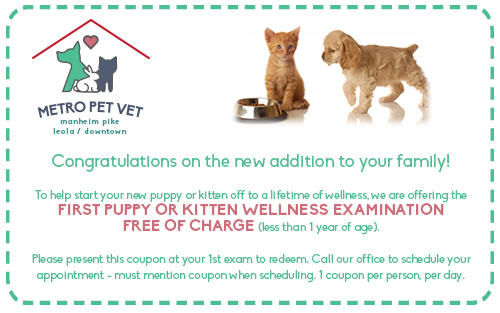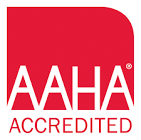New puppy?
We want to make your puppy’s visits to us as relaxed as possible.You can help us by preparing your puppy for this.
Getting Started
- Brushing their teeth, handling their feet and touching their ears will make our nose to tail examinations easier.
- Help them adjust to getting their nails trimmed by manipulating each toe individually many times a day and always make the puppy behave during this time.
- At first, make these sessions short then gradually lengthen them.
- Handling their ears may make future ear cleaning easier.
Always make these sessions a positive experience and reward your puppy for being good.


Here are some of the ways we can take care of your new pup:

Preventative Care Exam
A thorough physical exam is the most important part of your puppy’s visit. They will receive an exam from nose to tail. We want to be certain they are healthy before any vaccinations would be given.

Heartworm Prevention
Heartworm prevention is recommended to be given all year. A blood test will be needed regularly as an adult to insure that the medicine is working. Heartworms are parasites in the blood that are spread by mosquitoes. An infected mosquito bites your dog and the heartworm larva enters their system. The larva grows in the body for seven months before lodging in the heart itself. This causes heart damage and, if severe enough, heart failure.
Giving your pet a monthly preventative tablet all year for the rest of their life is the only way to prevent this deadly disease. Although this disease is endemic in the southern part of the country due to their mild winters; we still occasionally see heartworm positive dogs in this state.

Fecal Sample
A fecal sample should be checked once a year on all pets. The most common intestinal parasites are roundworms, hookworms, whipworms and coccidia. Roundworms infect most puppies, but they do not show up in every fecal sample. Puppies can be exposed to intestinal parasites in a number of ways: in utero, from other littermates or from their mother. Roundworms can also cause disease in humans, especially young children. For this reason, your puppy will be dewormed at their first visit, even if the fecal is negative.
The fecal is still important to identify any other parasites and determine the proper medications. Some intestinal worms can encyst in the wall of the intestine when your puppy is young and will be released to infect your pet during times of stress. For this reason, the CDC mandates that all pets should have a stool sample checked every six to twelve months. The monthly heartworm preventative will also deworm your pet for two of the major intestinal parasites seen in dogs. This is why we recommended giving preventative year round, not just in the months you see mosquitos.

Nutrition
Nutrition is an important part of your puppy’s health. Many dogs have sensitive gastrointestinal tracts and become ill easily if their diet changes in any way. It is best to choose a quality food that is readily available and consistently feed that diet. Table scraps and bones are not recommended and often make dogs seriously ill.
It is important to use a measuring cup to feed your puppy a specific amount each day. Measuring a daily ration will allow easier evaluation of the actual amount your puppy is eating. This system is especially important if your puppy is ill or if weight management becomes an issue as an adult dog. As a puppy, if you can meal feed (usually 2-3 times per day) rather than feeding free choice, it will help with house training. Most puppies have a bowel movement 15-30 minutes post eating. We recommend the following brands of food:
- Hill’s Science Diet
- Royal Canin
- Eukanuba
- Purina ONE or ProPlan formulas

Neutering
Neutering your pet has many important health benefits. They include eliminating ovarian cancer, testicular cancer, uterine cancer and uterine infections. It dramatically decreases the incidence of mammary cancer and prostate issues if done at a young age. It also virtually eliminates over-population problems. We recommend neutering your pet at approximately 6 months of age. The health benefits are the greatest if females are spayed before their first heat cycle. Aggression, roaming and marking behaviors can be greatly reduced or even eliminated by castrating a dog, even an older dog.

Dental Disease
Dental disease is often an overlooked part of pet care. This young age is the perfect time to get your pet accustomed to having its teeth brushed. Start by handling your puppy’s mouth often. Lift the lips and open the mouth while constantly reassuring and talking to your puppy. However, if they struggle too much or are nibbling and biting you even if playing, they must be firmly held and given a firm “NO.”
Never give up when the puppy is not cooperating or they will think they have “won” and future training sessions may be more difficult. Always end on a positive note when the puppy has done something well. As they grow accustomed to this exercise, you can begin rubbing the gums gently with your fingers. Gradually over weeks or months, you can progress to using a toothbrush and special pet toothpaste. Do not use human toothpaste, as the fluoride content is too high for dogs.

Flea and Tick Control
We have very effective, safe and easy solutions to controlling fleas and ticks on your puppy. We offer several topical or oral products that can protect your new companion. At your puppy’s visit with the veterinarian, we will discuss their individual risks and find the perfect product to keep your puppy flea and tick free! There are many copycat products that are simply flea sprays packaged to look like brand name products but since these are totally unregulated they could potentially cause harm to your pet.

Puppy Classes
Puppy classes and obedience training will benefit ALL pets and their owners. These classes can usually be started after the first series of vaccines, as early as 8 weeks of age. This is not formal obedience training, but just an introduction to the basics of training, socialization and developing good habits for both of you. A puppy has a small window of time to learn important socialization skills; a puppy class is invaluable to attend at this critical age before that window closes. It should be lots of fun for both of you and the time together is well spent.
Bringing home a puppy is an exciting and joyous event. But it may also be a bit overwhelming, especially if you’re a first-time pet owner. Puppies require a lot of care, and starting them off on the right paw is important. At Metro Pet Vet, we understand the importance of giving your puppy the best start in life, and we’re here to help make sure that happens. In this article, we cover the essential topics of puppy care, including the importance of an early visit to the vet, common health problems, signs of a healthy puppy, and when to start training. We hope this article will help you care for your puppy and ensure you can give your pup the best life possible. If you are located in or near Lancaster, PA and need help caring for your puppy, please contact us at (717) 569-6424 to schedule an appointment.
.jpg)
How Will Proper Puppy Care Impact My Dog’s Life?
One of the most important reasons to provide your puppy with proper care from the start is to ensure your dog's long, healthy life. Good nutrition and regular veterinary care are both essential for your pup’s health and well-being. Providing proper puppy care can also help prevent certain health conditions.
You should also consider the emotional benefits of providing good puppy care. A well-cared-for puppy is more socialized, better behaved, and more likely to develop into a trusting and loving companion.
Why Is It Important to Start Good Puppy Care on Day One?
It’s important to start proper puppy care as soon as you bring your pup home. This is especially true for puppies between 8 and 20 weeks of age, which is the period when they are most receptive to new information. During this time, providing your puppy with positive experiences and socialization is important. This will help them learn how to interact with humans and other animals in a positive way, preventing future behavior problems.
At this stage, it’s also important to begin basic obedience training such as sitting, staying, coming when called, and walking on a leash. Training sessions should be frequent but short in duration due to the puppy’s short attention span.
Finally, this is an ideal time to build a strong bond with your pup by providing lots of love and affection. The more time you spend together during these early years, the stronger your relationship will become.
.jpg)
How Soon Should I Bring My Puppy In to See a Veterinarian for Their First Exam?
The first step in providing proper puppy care is scheduling an appointment with your veterinarian as soon as possible. You should do this within the first week of bringing your pup home. The sooner you bring your pup in for an exam, the sooner you’ll learn more about their overall health and needs. Your veterinarian can also diagnose health issues that could be problematic in the future.
When preparing for the appointment, make sure to bring any vaccination records from the breeder, shelter, or rescue organization, as well as any information about deworming treatments. Bring a fresh stool sample for testing worms, and provide information on the brand and formula of food you’re feeding your pup.
At the vet’s office, expect to fill out some paperwork. Then, your veterinarian will perform a physical examination where they will check your pup’s eyes, ears, teeth, skin, abdomen, heart, lungs and joints. They may also check for breed-specific conditions and give advice on common health issues pertinent to your pet’s breed. Make sure to ask any questions you have and raise any concerns you may have.
What Are the Most Common Health Problems in Puppies?
While adorable and joyful, puppies are susceptible to various health problems. Some of the most common issues include:
- Arthritis
- Skin problems
- Ear infections
- Urinary tract infections (UTIs)
- Vomiting
- Diarrhea
- Parasites
- Dental disease
- Obesity
.jpg)
What Are Some Signs and Symptoms of Illness in Puppies?
It’s important to be aware of the signs and symptoms of illness in puppies in order to provide timely medical care when needed. Some common signs and symptoms include:
- Lethargy
- Dull coat
- Skin changes
- Changes in appetite
- Ear problems
- Diarrhea
- Vomiting
- Respiratory problems
- Behavior changes
- Joint stiffness
- Swollen gums
- Excessive thirst
- Runny nose or eyes
- Trouble urinating or defecating
It’s especially important to be on the lookout for any signs of parvovirus (Parvo), a highly contagious and potentially fatal virus. Symptoms include severe diarrhea, vomiting, fever, lethargy, dehydration, stomach pain, pale gums, and weakness. Another serious condition that puppies can contract is distemper, which attacks the respiratory, gastrointestinal, and nervous systems with symptoms such as green or yellow discharge from the eyes, fever, coughing, lethargy, decreased appetite, and vomiting.
What Are the Signs of a Healthy, Thriving Puppy?
Now that we’ve covered some of the common health issues in puppies, let’s take a look at the signs of a healthy, thriving puppy. A healthy mouth is characterized by relatively clean-smelling breath and clean teeth without tartar buildup. Additionally, a healthy coat should be shiny and clean due to natural oils and shedding. Consistent lean weight is also essential for a puppy’s health, while clear eyes are another indicator of good health. Clean ears and nose are also important signs of a healthy pup. Finally, consistent urine and stool frequency and texture are signs of good health.
When Should I Start Training My Puppy?
Start training your puppy as soon as you bring them home, teaching them basic commands like sit, stay, come, and down. Use positive reinforcement, keep training sessions short (5-10 minutes), and always end on a positive note. Puppies should also be exposed to various environments, activities, and people to help them become more familiar with the world around them. Proper socialization is especially important for service dogs to ensure that they can handle the pressures of the job.
Basic training for service dogs usually starts around 8 weeks, while more advanced training is delayed until around 6 months. This allows puppies to mature physically and emotionally before beginning more intensive training.
What Will My Vet Be Looking for When First Examining My Puppy?
At your puppy’s first veterinary appointment, your vet will perform a comprehensive physical examination. This exam includes an observation of the puppy’s overall body condition and checking the eyes, ears, and nose for redness, discharge, debris, or abnormalities. Your vet will also check your puppy’s mouth and teeth for tartar buildup, gum issues, retained baby teeth, broken teeth, and oral growths. They will evaluate the heart and lungs to check for abnormal rate or rhythm and other issues. Plus, your veterinarian will palpate the abdomen to search for abnormalities in the stomach, spleen, liver, kidneys, intestines and bladder.
Your vet will also suggest vaccinations, heartworm prevention, and routine deworming to prevent life-threatening diseases. Regular wellness exams should be conducted every 6 months to a year, depending on the pet’s breed, age, lifestyle and overall health.
Conclusion
Providing your puppy with proper care is key to their long-term health and well-being. From scheduling the first veterinary appointment to providing regular socialization and training, there are many steps you can take to ensure that your pup gets the best start in life. If you live in or near Lancaster, PA, and are looking for quality pet care, come visit us at Metro Pet Vet where your pet is our priority. Contact us at (717) 569-6424 to set an appointment, or email us at [email protected]. Our staff would love to talk with you!
Don't forget to follow us on social media: Facebook, Instagram.


